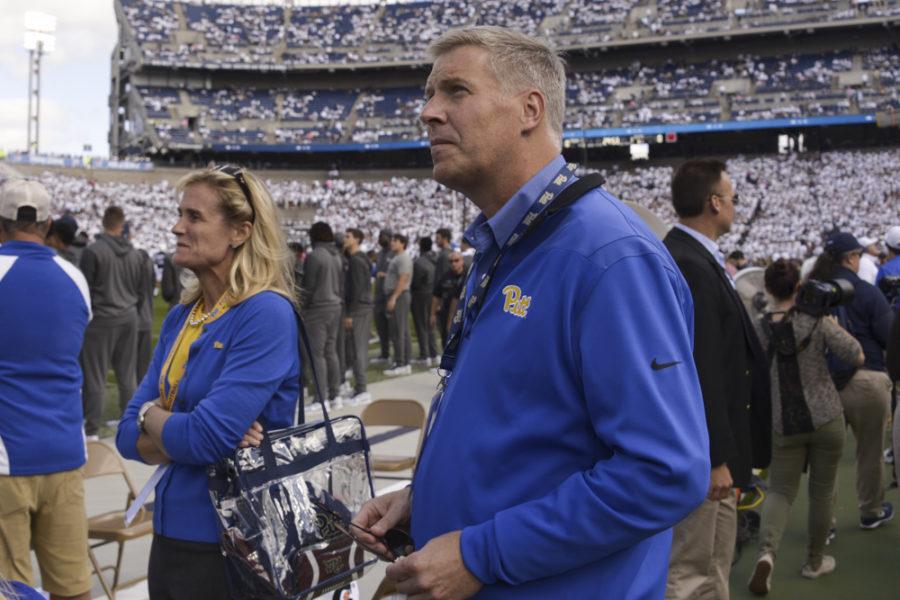Lyke talks football scheduling, gambling and campus returns
Pitt Chancellor Pat Gallagher and Athletic Director Heather Lyke stand on the field before the game. (Photo by Wenhao Wu / Assistant Visual Editor)
July 24, 2020
Athletic Director Heather Lyke said she is not encouraged by the way the COVID-19 pandemic mitigation is progressing. As cases continue to rise across the country — particularly in Pitt’s home of Allegheny County — she offered a pessimistic, yet not definitive answer to what she called “the million dollar question” — will college football be played in 2020?
“I am an optimistic person at heart, but I wouldn’t say I’m overly confident,” Lyke said.
Pitt football players returned to campus on June 8 and began workouts after completing a two week quarantine period. According to Lyke, the program considered expanding the number of players allowed in the same workout group from 25 to 50, but a string of several days of record-setting positive COVID-19 case tallies forced Pitt to delay.
While few games on Pitt’s schedule have been altered — save for a week two matchup with the Colonial Athletic Association’s Richmond Spiders, who, despite a canceled football season, might still try to play some games — they are under threat as college football’s loose plans become even more uncertain.
National college football writer Brett McMurphy reported Thursday morning that a number of options are on the table for the ACC’s football season. Whether they follow the Big Ten and Pac-12’s lead and play only the normal eight conference games already scheduled or a longer 10-game schedule, the move to ACC plus Notre Dame games only seems inevitable.
Pitt still plans on hosting Miami (OH) for the 2020 season opener on Sept. 5, but that game and any subsequent contests will likely look radically different from seasons past. Lyke said Pitt and its Heinz Field roommate the Pittsburgh Steelers are working on a plan to allow 15,000 to 20,000 fans in a socially distant stadium with a mask mandate.
But even that would require approval from Gov. Tom Wolf, in addition to a rapid change in the progression of virus mitigation efforts.
And more successful mitigation seems unlikely, as Lyke openly admits that with Pitt’s campus reopening for classes in the fall, there is little the University can do to enforce social distancing among athletes and regular students alike.
“It’s impossible to keep kids away from one another,” Lyke said. “I expect there will be some increase in cases. Hopefully it’s not really exorbitant.”
College football might not be in the cards for 2020, but it is, for now, a safe assumption that it will be played at some point in the future. With the games, pushes for radical reform of the pre-professional football model will resume as well.
Lyke also testified before the Senate Judiciary Committee during a hearing on Wednesday afternoon about the NCAA’s policies regarding the rights players have to their own name, image and likeness, as well as state and federal college sports gambling laws.
Her testimony offered a prediction of the negative effects that gambling on college sports could have on the psyche of competing athletes.
“While currently a spectator’s pride and team spirit might hinge on a win or loss, if sports gambling is permitted, one’s livelihood could depend on the outcome of a Saturday afternoon game,” she said in her written testimony. “This significantly increases the pressure of student-athletes to perform or not perform depending on the current bet.”
She said she is also worried about the accessibility of sports gambling today. Gamblers can submit bets online from almost anywhere, making it too easy for betters to, as Lyke puts it, “turn your college football venues into a casino.”
Lyke said her testimony represents an opinion shared by college athletics officials and staff, as well as the athletes themselves, from across the ACC. According to Lyke, her testimony was universally supported by the conference’s presidents, athletic directors, athletic faculty representatives and student-athlete advisory councils.
“I think it’s been well received,” she said. “I’ve gotten a number of messages from across the country and the ACC as a sort of ‘thanks for carrying the torch’ … The addition of college gambling is another level.”








